Exploring Organizational Behavior, Transformative Leadership, Learning
VerifiedAdded on 2023/04/21
|6
|1044
|82
Report
AI Summary
This report provides an overview of key concepts in organization management and leadership, including organizational behavior, transformational leadership, effective learning, and critical thinking. It defines organizational behavior as the study of people's actions within groups and the factors influencing these behaviors, highlighting the importance of understanding these dynamics for improving organizational effectiveness. Transformational leadership is discussed as a process where leaders and followers elevate each other's motivation and morality, emphasizing qualities such as goal-setting, integrity, and inspiring others. The report also covers life-long learning as continuous knowledge acquisition for personal and professional development, various teaching styles, the role of stakeholders, the concept of inclusion, the management process, ethical management, and critical thinking as the ability to evaluate information rationally. The paper concludes by citing the works of various authors.

Surname 1
Student’s Name
Instructor’s Name
Course
Date
Student’s Name
Instructor’s Name
Course
Date
Paraphrase This Document
Need a fresh take? Get an instant paraphrase of this document with our AI Paraphraser
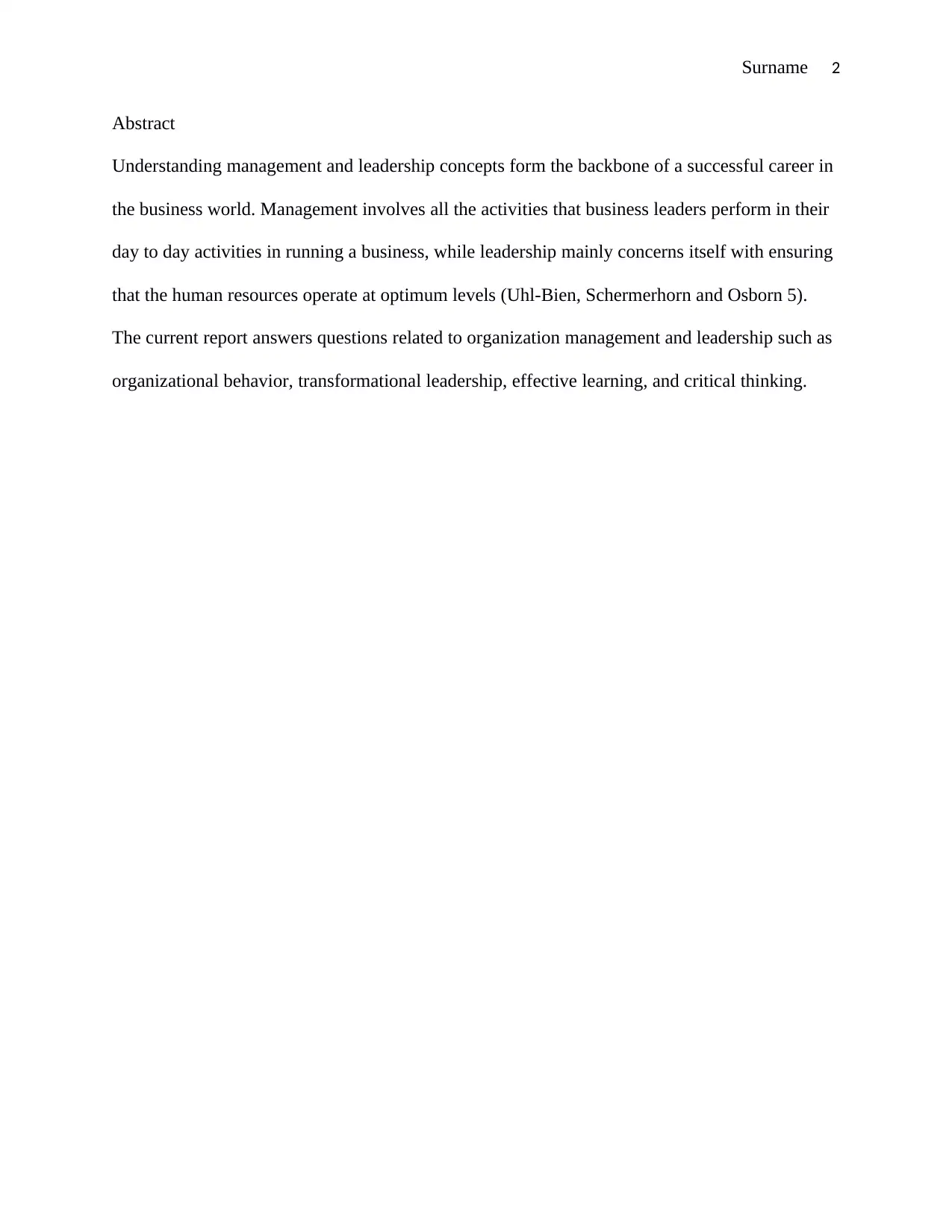
Surname 2
Abstract
Understanding management and leadership concepts form the backbone of a successful career in
the business world. Management involves all the activities that business leaders perform in their
day to day activities in running a business, while leadership mainly concerns itself with ensuring
that the human resources operate at optimum levels (Uhl-Bien, Schermerhorn and Osborn 5).
The current report answers questions related to organization management and leadership such as
organizational behavior, transformational leadership, effective learning, and critical thinking.
Abstract
Understanding management and leadership concepts form the backbone of a successful career in
the business world. Management involves all the activities that business leaders perform in their
day to day activities in running a business, while leadership mainly concerns itself with ensuring
that the human resources operate at optimum levels (Uhl-Bien, Schermerhorn and Osborn 5).
The current report answers questions related to organization management and leadership such as
organizational behavior, transformational leadership, effective learning, and critical thinking.
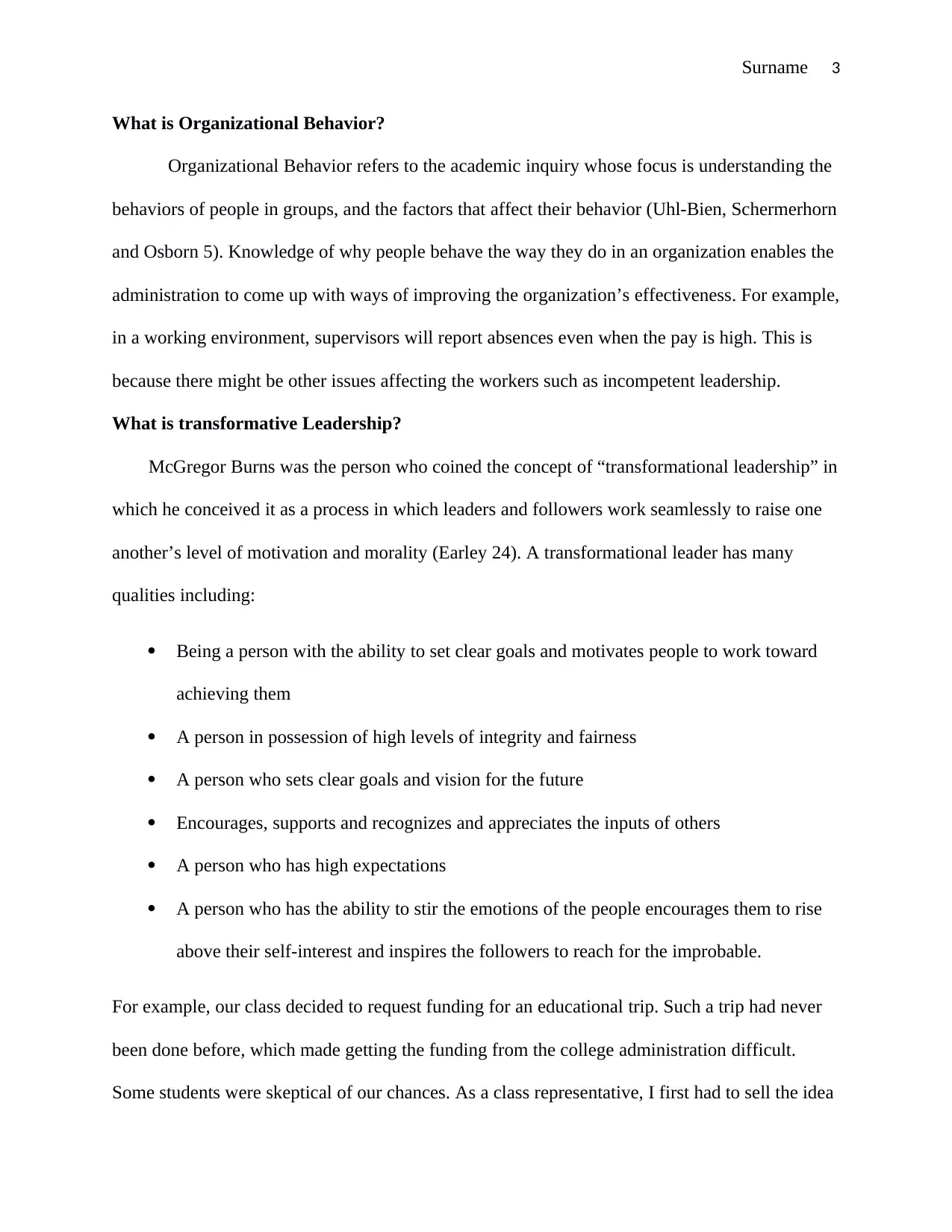
Surname 3
What is Organizational Behavior?
Organizational Behavior refers to the academic inquiry whose focus is understanding the
behaviors of people in groups, and the factors that affect their behavior (Uhl-Bien, Schermerhorn
and Osborn 5). Knowledge of why people behave the way they do in an organization enables the
administration to come up with ways of improving the organization’s effectiveness. For example,
in a working environment, supervisors will report absences even when the pay is high. This is
because there might be other issues affecting the workers such as incompetent leadership.
What is transformative Leadership?
McGregor Burns was the person who coined the concept of “transformational leadership” in
which he conceived it as a process in which leaders and followers work seamlessly to raise one
another’s level of motivation and morality (Earley 24). A transformational leader has many
qualities including:
Being a person with the ability to set clear goals and motivates people to work toward
achieving them
A person in possession of high levels of integrity and fairness
A person who sets clear goals and vision for the future
Encourages, supports and recognizes and appreciates the inputs of others
A person who has high expectations
A person who has the ability to stir the emotions of the people encourages them to rise
above their self-interest and inspires the followers to reach for the improbable.
For example, our class decided to request funding for an educational trip. Such a trip had never
been done before, which made getting the funding from the college administration difficult.
Some students were skeptical of our chances. As a class representative, I first had to sell the idea
What is Organizational Behavior?
Organizational Behavior refers to the academic inquiry whose focus is understanding the
behaviors of people in groups, and the factors that affect their behavior (Uhl-Bien, Schermerhorn
and Osborn 5). Knowledge of why people behave the way they do in an organization enables the
administration to come up with ways of improving the organization’s effectiveness. For example,
in a working environment, supervisors will report absences even when the pay is high. This is
because there might be other issues affecting the workers such as incompetent leadership.
What is transformative Leadership?
McGregor Burns was the person who coined the concept of “transformational leadership” in
which he conceived it as a process in which leaders and followers work seamlessly to raise one
another’s level of motivation and morality (Earley 24). A transformational leader has many
qualities including:
Being a person with the ability to set clear goals and motivates people to work toward
achieving them
A person in possession of high levels of integrity and fairness
A person who sets clear goals and vision for the future
Encourages, supports and recognizes and appreciates the inputs of others
A person who has high expectations
A person who has the ability to stir the emotions of the people encourages them to rise
above their self-interest and inspires the followers to reach for the improbable.
For example, our class decided to request funding for an educational trip. Such a trip had never
been done before, which made getting the funding from the college administration difficult.
Some students were skeptical of our chances. As a class representative, I first had to sell the idea
⊘ This is a preview!⊘
Do you want full access?
Subscribe today to unlock all pages.

Trusted by 1+ million students worldwide
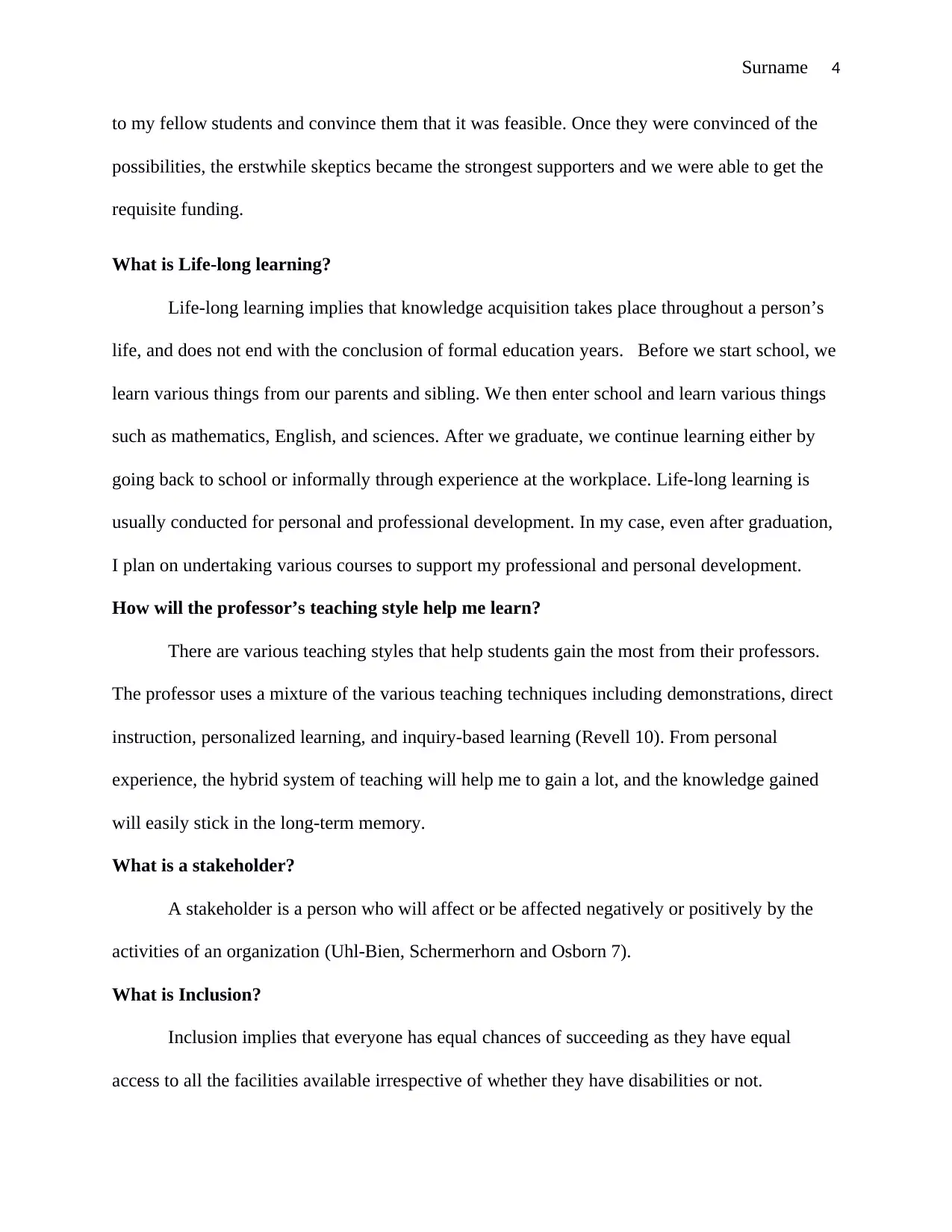
Surname 4
to my fellow students and convince them that it was feasible. Once they were convinced of the
possibilities, the erstwhile skeptics became the strongest supporters and we were able to get the
requisite funding.
What is Life-long learning?
Life-long learning implies that knowledge acquisition takes place throughout a person’s
life, and does not end with the conclusion of formal education years. Before we start school, we
learn various things from our parents and sibling. We then enter school and learn various things
such as mathematics, English, and sciences. After we graduate, we continue learning either by
going back to school or informally through experience at the workplace. Life-long learning is
usually conducted for personal and professional development. In my case, even after graduation,
I plan on undertaking various courses to support my professional and personal development.
How will the professor’s teaching style help me learn?
There are various teaching styles that help students gain the most from their professors.
The professor uses a mixture of the various teaching techniques including demonstrations, direct
instruction, personalized learning, and inquiry-based learning (Revell 10). From personal
experience, the hybrid system of teaching will help me to gain a lot, and the knowledge gained
will easily stick in the long-term memory.
What is a stakeholder?
A stakeholder is a person who will affect or be affected negatively or positively by the
activities of an organization (Uhl-Bien, Schermerhorn and Osborn 7).
What is Inclusion?
Inclusion implies that everyone has equal chances of succeeding as they have equal
access to all the facilities available irrespective of whether they have disabilities or not.
to my fellow students and convince them that it was feasible. Once they were convinced of the
possibilities, the erstwhile skeptics became the strongest supporters and we were able to get the
requisite funding.
What is Life-long learning?
Life-long learning implies that knowledge acquisition takes place throughout a person’s
life, and does not end with the conclusion of formal education years. Before we start school, we
learn various things from our parents and sibling. We then enter school and learn various things
such as mathematics, English, and sciences. After we graduate, we continue learning either by
going back to school or informally through experience at the workplace. Life-long learning is
usually conducted for personal and professional development. In my case, even after graduation,
I plan on undertaking various courses to support my professional and personal development.
How will the professor’s teaching style help me learn?
There are various teaching styles that help students gain the most from their professors.
The professor uses a mixture of the various teaching techniques including demonstrations, direct
instruction, personalized learning, and inquiry-based learning (Revell 10). From personal
experience, the hybrid system of teaching will help me to gain a lot, and the knowledge gained
will easily stick in the long-term memory.
What is a stakeholder?
A stakeholder is a person who will affect or be affected negatively or positively by the
activities of an organization (Uhl-Bien, Schermerhorn and Osborn 7).
What is Inclusion?
Inclusion implies that everyone has equal chances of succeeding as they have equal
access to all the facilities available irrespective of whether they have disabilities or not.
Paraphrase This Document
Need a fresh take? Get an instant paraphrase of this document with our AI Paraphraser
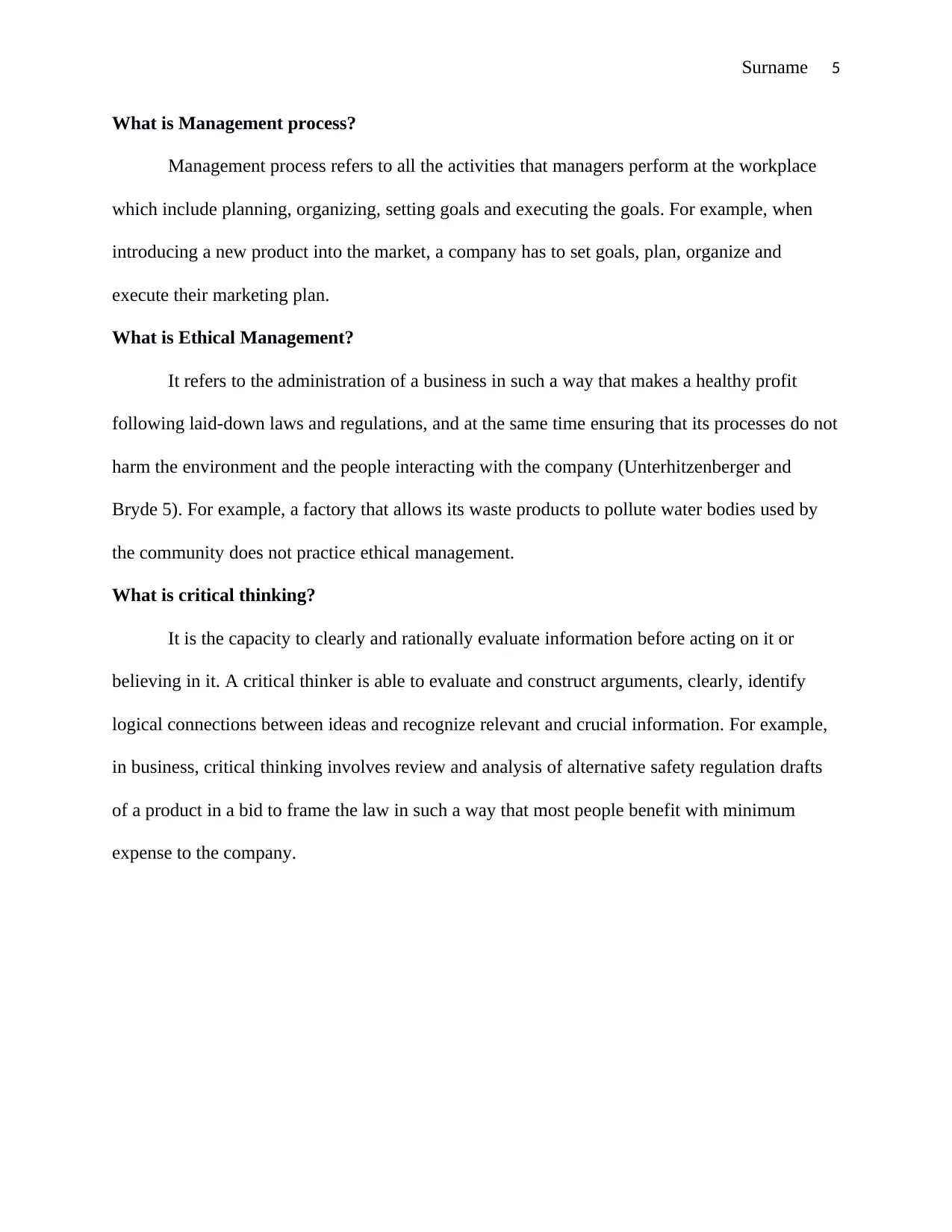
Surname 5
What is Management process?
Management process refers to all the activities that managers perform at the workplace
which include planning, organizing, setting goals and executing the goals. For example, when
introducing a new product into the market, a company has to set goals, plan, organize and
execute their marketing plan.
What is Ethical Management?
It refers to the administration of a business in such a way that makes a healthy profit
following laid-down laws and regulations, and at the same time ensuring that its processes do not
harm the environment and the people interacting with the company (Unterhitzenberger and
Bryde 5). For example, a factory that allows its waste products to pollute water bodies used by
the community does not practice ethical management.
What is critical thinking?
It is the capacity to clearly and rationally evaluate information before acting on it or
believing in it. A critical thinker is able to evaluate and construct arguments, clearly, identify
logical connections between ideas and recognize relevant and crucial information. For example,
in business, critical thinking involves review and analysis of alternative safety regulation drafts
of a product in a bid to frame the law in such a way that most people benefit with minimum
expense to the company.
What is Management process?
Management process refers to all the activities that managers perform at the workplace
which include planning, organizing, setting goals and executing the goals. For example, when
introducing a new product into the market, a company has to set goals, plan, organize and
execute their marketing plan.
What is Ethical Management?
It refers to the administration of a business in such a way that makes a healthy profit
following laid-down laws and regulations, and at the same time ensuring that its processes do not
harm the environment and the people interacting with the company (Unterhitzenberger and
Bryde 5). For example, a factory that allows its waste products to pollute water bodies used by
the community does not practice ethical management.
What is critical thinking?
It is the capacity to clearly and rationally evaluate information before acting on it or
believing in it. A critical thinker is able to evaluate and construct arguments, clearly, identify
logical connections between ideas and recognize relevant and crucial information. For example,
in business, critical thinking involves review and analysis of alternative safety regulation drafts
of a product in a bid to frame the law in such a way that most people benefit with minimum
expense to the company.
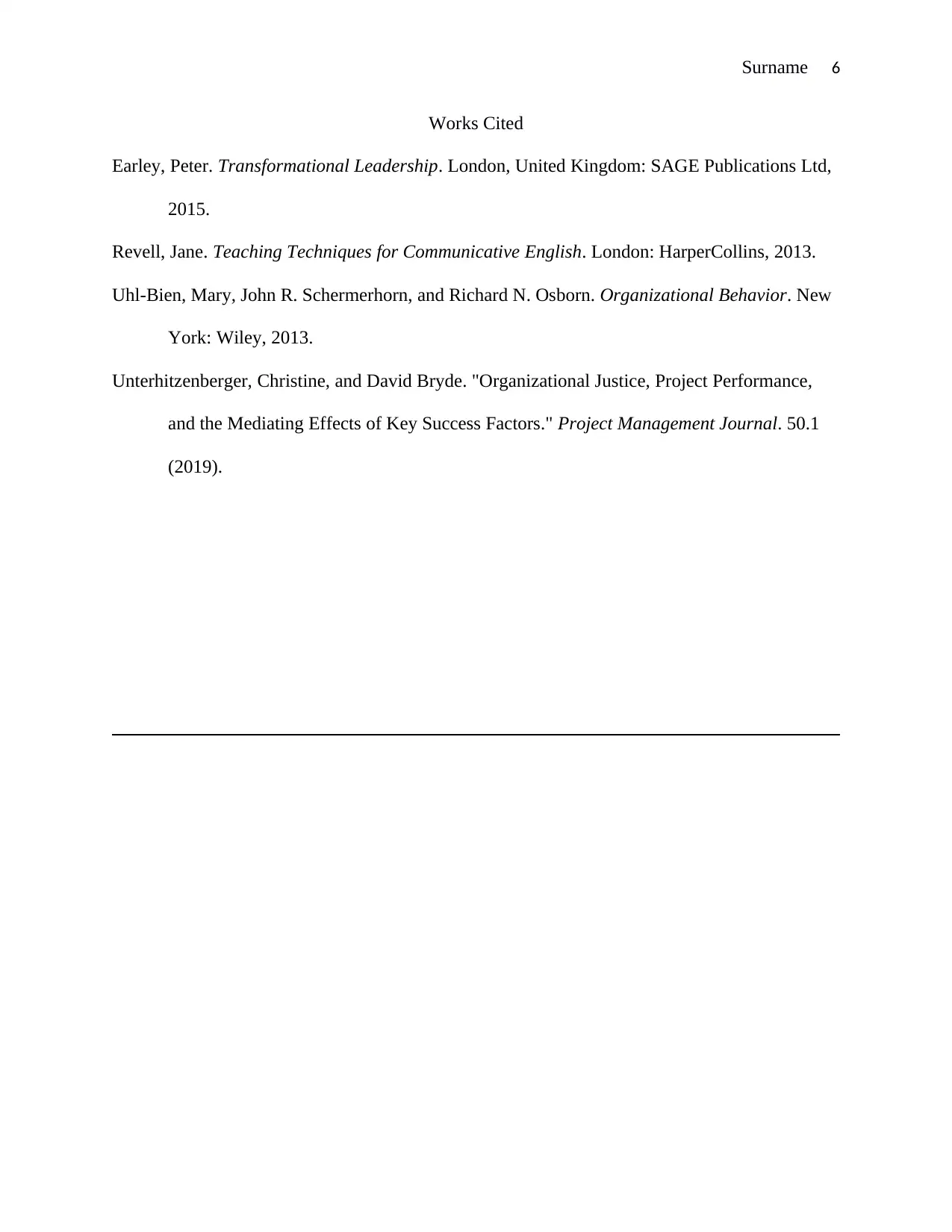
Surname 6
Works Cited
Earley, Peter. Transformational Leadership. London, United Kingdom: SAGE Publications Ltd,
2015.
Revell, Jane. Teaching Techniques for Communicative English. London: HarperCollins, 2013.
Uhl-Bien, Mary, John R. Schermerhorn, and Richard N. Osborn. Organizational Behavior. New
York: Wiley, 2013.
Unterhitzenberger, Christine, and David Bryde. "Organizational Justice, Project Performance,
and the Mediating Effects of Key Success Factors." Project Management Journal. 50.1
(2019).
Works Cited
Earley, Peter. Transformational Leadership. London, United Kingdom: SAGE Publications Ltd,
2015.
Revell, Jane. Teaching Techniques for Communicative English. London: HarperCollins, 2013.
Uhl-Bien, Mary, John R. Schermerhorn, and Richard N. Osborn. Organizational Behavior. New
York: Wiley, 2013.
Unterhitzenberger, Christine, and David Bryde. "Organizational Justice, Project Performance,
and the Mediating Effects of Key Success Factors." Project Management Journal. 50.1
(2019).
⊘ This is a preview!⊘
Do you want full access?
Subscribe today to unlock all pages.

Trusted by 1+ million students worldwide
1 out of 6
Related Documents
Your All-in-One AI-Powered Toolkit for Academic Success.
+13062052269
info@desklib.com
Available 24*7 on WhatsApp / Email
![[object Object]](/_next/static/media/star-bottom.7253800d.svg)
Unlock your academic potential
Copyright © 2020–2026 A2Z Services. All Rights Reserved. Developed and managed by ZUCOL.





